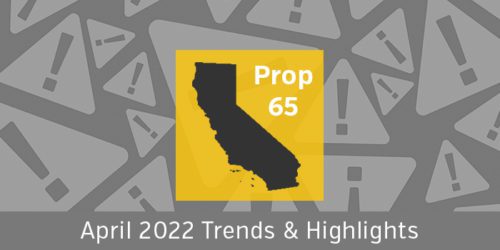Proposition 65 Notices of the Month – April 2022: Continued Focus of Alleged Lead in Glass Ceramic Products
April 2022
Proposition 65: Trends and Highlights in April 2022
In April 2022, citizen plaintiff groups issued one hundred eighty-six (186) new Proposition 65 (“Prop. 65”) Notices of Violation (“Notices”), which was approximately twenty (20) less Notices than the month before. While there was a slight decrease in Notices for acrylamide products as compared to last month, there continues to be a consistent trend each month for Notices targeting alleged lead in household glass ceramic products. This alert discusses these claims and other trends in Prop. 65 Notices for the month of April 2022.
Prop. 65, the Safe Drinking Water and Toxic Enforcement Act of 1986, requires “clear and reasonable warnings” on products sold in California if use of the products causes exposure to chemicals on the Prop. 65 List. Prop. 65 also gives interested citizen plaintiffs a private right of action to enforce these claims and recover their attorneys’ fees if they are successful. Common chemicals in Notices that are typically targeted include lead, acrylamide, cadmium, arsenic, mercury, and phthalates (Di(2-ethylhexyl)), phthalate (“DEHP”), diisononyl phthalate (“DINP”), and Di-n-butyl phthalate (“DBP”).
In the April Notices, as is the case every month, citizen plaintiff groups alleged that various chemicals in food, consumer products, and personal care products required Prop. 65 warning labels because the products’ use or consumption exposes California consumers to chemicals in quantities that could cause cancer or reproductive harm.
60-Day Notices for Food
In April, the majority of Notices sent by plaintiff citizen enforcers related to allegations that alleged lead and metals in numerous types of foods required Prop. 65 warning labels.
- Metals in Fruits & Vegetables. Plaintiff citizen enforcers sent approximately twenty-one (21) Notices in April alleging that different types of fruits and vegetables required a Prop. 65 warning label because of their alleged lead and metals content. Noticed products included sweet potatoes, kale chips, figs, dried apricots, Goji berries, and other miscellaneous ginger products.
- Acrylamide in Crispy and Roasted Foods.[1] Down from last month, plaintiff citizen enforcers sent seven (7) total Notices for foods that allegedly contained acrylamide at levels that required a Prop. 65 warning label. These foods included chips, biscuits, and cookies.
- Metals in Seafood. Plaintiff citizen enforcers also sent eight (8) Notices alleging that lead and metals in various seafood required a Prop. 65 warning label. Specific products included dried seaweed, sushi Nori, crayfish, and dried shrimp.
- Metals in Dietary Supplements. As with prior months, dietary supplements remained another target for April 2022. Three Notices alleged that heavy metals including lead and cadmium in various dietary supplements required a Prop. 65 warning label.
- Lead and Arsenic in Other Spice Products. Finally, plaintiff groups issued approximately seventeen (17) Notices alleging that various spice products such as masala, turmeric, and cumin powder contained lead and required a Prop. 65 warning.
60-Day Notices for Consumer Products
The focus of consumer product Notices in April 2022 remained on alleged phthalates (DEHP, DINP and DBP) in plastic products and alleged lead in ceramics and hardware. Indeed, we are starting to see a continued presence and uptick for Notice issued for household glass ceramic products.
- Lead in Ceramics and Glassware. Approximately nine (9) Notices alleged that lead in mugs, glassware, and other ceramic products required a Prop. 65 warning label.
- Phthalates (DEHP, DINP, DBP) and BPA in Plastic Products and Components. Plaintiff citizen enforcers sent over seventy (70) Notices alleging that various phthalates in pliable plastic products required Prop. 65 warning labels. The products at issue are diverse, but included cases, covers, helmets, hoses, vinyl products, organizers, and travel kits.
What Should Food, Consumer Product, Personal Care, and Manufacturing Businesses Do Next?
Prop. 65 trends change each month according to the state of the law, interests of citizen plaintiff groups, as well as the concentrations of chemicals in easily accessible products. Companies doing significant business in California should monitor Prop. 65 notices and trends and use the Prop. 65 warning language on California products when required.
Prop. 65 is a substantial risk issue for companies selling products in California. Compliance and labeling is costly, as is a Prop. 65 dispute, which can subject a potential defendant to attorneys’ fees in both defending the claim and the plaintiff’s attorneys’ fees as well.
Complying with Prop. 65 includes testing products for common Prop. 65 chemicals and understanding potential exposure of the public to the chemical at issue. Implementing contractual indemnity language in the supply chain helps to ensure that products sold in California (either online or in brick-and-mortar stores) are adequately screened by upstream manufacturers, suppliers, and producers for Prop. 65 compliance. Prop. 65 liability most frequently rests with those up the supply chain. For those businesses, monitoring Prop. 65 trends and common claims is a key part of a successful compliance program.
[1] The issue of the acrylamide cancer warning label is presently being litigated in the Eastern District of California and Ninth Circuit Court of Appeals, in Cal. Chamber of Commerce v. Becerra, Case No. 2:19-cv-02019. The Ninth Circuit recently upheld the district court’s issuance of a preliminary injunction that Prop. 65 warnings for acrylamide as a carcinogen is not supported, but the injunction does not address acrylamide as a reproductive toxicant and the underlying litigation is far from over. The California Attorney General’s website discusses the Prop. 65 acrylamide litigation and Ninth Circuit appeal at: https://oag.ca.gov/prop65.

